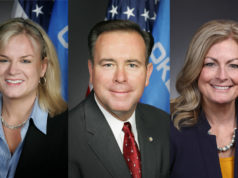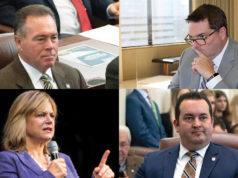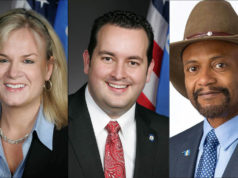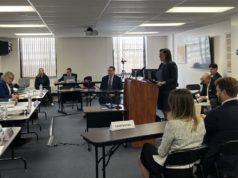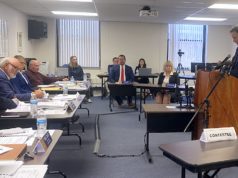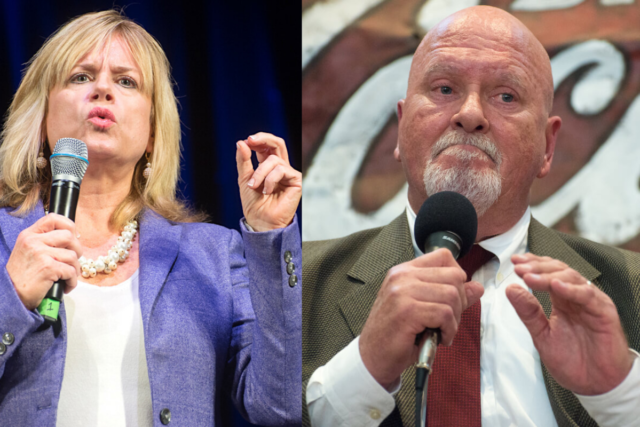

Three candidates will compete Nov. 6 to become Oklahoma’s next commissioner of labor. The commissioner heads the Oklahoma Department of Labor and must implement labor-related laws from the Legislature.
Gov. Mary Fallin appointed Melissa McLawhorn Houston to serve as commissioner of labor in November 2015 following the death of Mark Costello. Houston has said she never planned to run for re-election.
Republican candidate Rep. Leslie Osborn (R-Mustang) was elected to the Oklahoma House of Representatives in 2008. She would not have been term-limited until 2020, but said the opening for commissioner of labor made her leave the Legislature early.
“When I was working with the [department of labor] I just really liked what they do. And there’s a lot of misconception about what they do,” Osborn said in an interview with NonDoc. “But, really, it’s more of a regulatory and licensure agency. And it really focuses on safety programs for employees across the state.”
In addition to her tenure in the House, Osborn owned and operated a small business for 22 years. She said it gave her insight into what businesses need from the Department of Labor.
Democratic candidate Fred Dorrell spent 34 years with Ford Motor Company working at a Tulsa glass plant. The National Ford Department appointed Dorrell to be a United Auto Workers benefits representative and, most recently, he has been a human resources labor specialist for Spirit Aero Systems.
Dorrell said his dual experience as both a laborer and administrator has prepared him to be commissioner of labor.
“We need somebody who has the experience, the background and has the ability to listen not just to the wage earner but to the business and everybody,” Dorrell said in an interview with NonDoc. “My whole life has been about bringing people from different viewpoints to a common goal.”
Independent Brandt Dismukes is also running for commissioner of labor. He did not respond to requests for an interview, but a video in which the Oklahoma City resident outlines his platform was uploaded to YouTube on Sept. 8 (see below).
https://youtu.be/ELZoKBP5PK8
Both Osborn and Dorrell participated in a Republican primary debate and a Democratic primary debate, respectively. Both debates were hosted by NonDoc, Let’s Fix This and Generation Citizen.
Dorrell seeks to be advocate for laborers
Oklahoma’s state motto is “labor omnia vincit,” which translates to “labor conquers all.” From Title 40 of Oklahoma statutes, the prerogative of the commissioner of labor is to “foster, promote, and develop the welfare of the wage earners of this state.”
Dorrell insisted he would be an advocate for all Oklahoma workers.
“There’s a lot of issues with wage and hour issues — I call it wage robbery — where they need to feel like they’ve got some place to turn and go to and that someone will listen,” Dorrell said. “My experience has been that, when there appears to be inequities and problems, sometimes it’s as simple as establishing a relationship. Picking up the phone and talking to the parties and saying, ‘Come on, what’s going on here?”
Dorrell acknowledged that the Department of Labor has bureaucratic solutions for work-related issues as well. He said multiple times that strong jobs require a cooperation between workers and companies.
“Often times, unions don’t understand companies and companies don’t understand unions and it’s not rocket science,” Dorrell said. “Unions are a reflection of their own leadership, just like we are in our own democracies.”
He said his three priorities were workplace safety, a living wage for workers and skill-oriented training programs.
“I think it’s imperative that the labor commissioner be proactive and work with the Department of Commerce,” Dorrell said. “For those employers that have an interest to come to the state of Oklahoma, to advocate for those and find out what skill set, what knowledge base, what areas work with the communities and work with the [employers].”
Dorrell said one of his newer policy positions is increased focus on mental health care in the workplace. He attributes this position to former Republican commissioner of labor candidate Cathy Costello and the death of his son.
“I think what we need is identifiers, and I think that requires professionals, doctors, people to have a task force to identify what can we do.” Dorrell said. “We need to talk about these things.”
Osborn focused on job skills, safety programs
Osborn also identified vo-tech and job skill programs as a focus, citing an executive order that puts workforce development under the Department of Labor’s purview.
“It’s so important to be doing constant monitoring of who is providing the jobs in your state,” Osborn said. “Find which of those businesses are having a hard time recruiting people they need in their workforce and then work with our common education system, our career tech system, our higher ed system, about really pushing workforce development.”
Osborn talked about increasing the visibility of the Department of Labor by promoting safety programs it already offers. She said the program is especially effective for small and mid-sized businesses who cannot afford private safety consultations.
“No matter where you work, whether for a private business or for a state, city, county or school. There are programs that are free to those entities to come out and make sure you’re keeping your employees safe,” Osborn said. “We hear a lot of times about everything Oklahoma’s doing wrong. This is one of the things that we are one of the most highly ranked states in being proactive to keep our employees safe. I think that’s a great thing and we need to keep publicizing that.”
Per an executive order last December, the Department of Labor now acts as the central coordinating agency for all occupational licensing in Oklahoma. Osborn talked about SB 1475 as a high-priority opportunity for the labor commissioner to streamline licensure requirements.
“The task force will be meeting periodically with members of the Legislature and members of industry and going through each of those licenses with input from citizens and industry,” Osborn said. “Are these working the way they should?”
Osborn said the end result would be to eliminate overly stringent requirements and to make it easier to certify people with felony convictions. She reiterated the felony requirements are necessary for some licenses.









